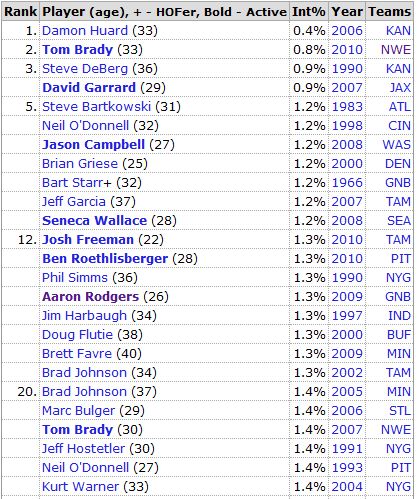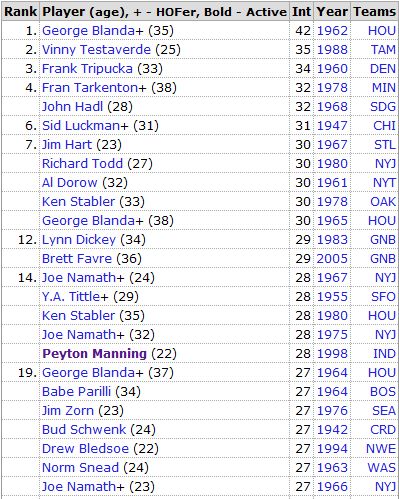[Preface: With apologies to people those of you who sat through or otherwise already read my NFL Live Blog from Sunday, it is incredibly long, so I thought maybe I should split out individual posts for some of the individual topics I covered. I’ve removed the time-stamps and re-organized a bit, but this is all original, so it obviously may not be as clean or detailed as a regular article (any additional comments I’ll put in brackets or at the end). If this sort of stuff interests you, I will be live-blogging again this Sunday.]
Aaron Schatz tweeted:
Bills go for it on fourth-and-14 from NE 35… and Fitzpatrick throws his second pick (first that is his fault)
4th and 14 is a situation where I think more quarterbacks throw too few interceptions than throw too many.
[As you can note from this post, an issue I’m very interested in is how to judge interceptions more fairly. As I said in the comments, “I’m conceptually drawn to the similarity between the stigma against interceptions and the stigma against going for it on 4th down.” E.g., a coach who played optimal 4th down strategy would easily lead the league in 4th down turnovers.]
Though, I have to admit, Aaron Rodgers is a great QB who seems to defy my “Show me a QB who doesn’t throw interceptions, and I’ll show you a sucky quarterback” rule of thumb. And it’s not like Tom Brady, who throws INT’s when his team is struggling and doesn’t throw them when his team is awesome (which, ofc, I have NO problem with): Rodgers has a crazy-low INT rate on a team that has been mediocre (2008), good-but-not-great (2009), or all over the place (2010) during his 3 years as a starter.
Ok, purely for fun, let’s compare the all-time single-season leaders in (low) Int% (from Pro Football Reference):
With the all-time leaders for most INT thrown (also from Pro Football Reference):
Not drawing any conclusions or doing any scientific comparisons, but both lists seem to have plenty of studs as well as plenty of duds. (Actually, when I first made this comparison a couple of years ago, the “Most” list had a much better resume than the “Least” list. But since then, the ‘good’ list has added several quality new members.)


Okay, I’ll bite here. Doesn’t some of this seem to be counterintuitive? For example Roger Staubach: his best seasons are correlated with his lowest interception rates. I’d bring up 1950s passers, but early 1950s are dominated by war vets.
I’m concerned a trend is being built here on the backs of two exceptional players, Terry Bradshaw and Troy Aikman, both really raw coming out and going to really bad teams with nothing to lose in playing them. The other lucky element here is these bad team then went on to dominate their respective decades.
If you were to conduct thought experiments and extrapolate back into Tom Brady’s rookie year, if Drew Bledsoe was to have been injured in the first game of 2000, how would a season of Tom Brady as a rookie have appeared?
One last point. If you draw a line through Brian Burke’s expected points graphs, trying to eyeball a linear best fit to his first and ten expected points data, you get a line that is about -1 at y = 0, about 5 points at y = 100, yielding a slope of 0.06 points per yard. Turnovers, in this linear estimate, become 4 points. 4 points / 0.06 = 66.7 yards, suggesting that we underestimate the value of interceptions in yards in many recent stats.
D-
A QB’s “best” seasons (as measured by success-based or box-score based statistics) will most definitely correspond to lower interception rates. This is in no way inconsistent with my thinking. There are two main reasons:
1. Your “best” seasons will necessarily be the ones where you “ran well”, or where more of your gambles broke your way. E.g.: a poker player’s “best” tournaments will be the ones where he is never caught bluffing. A team’s “best” seasons will be the ones where they convert their crucial 4th downs. This says nothing about how much they should have been bluffing, or should have been going for it on 4th down, or should have been taking the risks that lead to interceptions.
2. Your “best” seasons will necessarily happen when you have the best team around you. When that’s the case, you should have a lot fewer circumstances where risking interceptions is the best play. Also, even if they do come up, you may have the luxury to pass them up, since your team is successful anyway and you’d rather not take the statistical hit.
I’m not advocating that interceptions are awesome and all qb’s should be throwing them all the time. Saying “INT’s are bad” is obvious and tells us little about win-maximizing risk strategy. For another poker analogy, losing showdowns is bad, but I’ve argued (and then proved statistically) that winning an extremely high percentage of showdowns in the long-run is sub-optimal, b/c 1) you’ll miss a lot of marginal-but-profitable calls, and/or 2) you won’t be bluffing enough. (Conversely, as with Roger Staubach, the best poker players *in their hottest streaks* will have extremely high showdown W%—that doesn’t means they were playing badly, nor does it invalidate my broader results).
Finally, your suspicions about Aikman and Bradshaw are unjustified. Yes, those two data points make the graph from my “Alanis Loves Rookie QB’s” post much prettier, but the overall dataset I’ve worked with is much larger, and I’ve tried trimming outliers to make sure the results are solid, and they are.